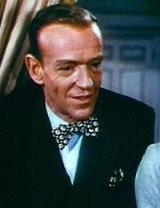
film and Broadway
stage dancer, choreographer, singer and actor. His stage and subsequent film career spanned a total of 76 years, during which he made 31 musical film
s. He was named the fifth Greatest Male Star of All Time
by the American Film Institute
. He is particularly associated with Ginger Rogers
, with whom he made ten films.
Gene Kelly
, another major innovator in filmed dance, said that "the history of dance on film begins with Astaire".
I have no desire to prove anything by it. I have never used it as an outlet or a means of expressing myself. I just dance.![]()
When working on my choreography I am not always receptive to outside suggestions or opinions. I believe that if you have something in mind in the way of a creation, such as a new dance, a sequence, or an effect, you are certain to come up with inaccurate criticism and damaging results if you go around asking for opinions.![]()
But I do nothing that I don't like, such as "inventing" up to the arty or "down" to the corny. I happen to relish a certain type of corn. What I think is the really dangerous approach is the "let's be artistic" attitude. I know that artistry just happens.![]()
Either the camera will dance, or I will.![]()
There comes a day when people begin to say, 'Why doesn't that old duffer retire?' I want to get out while they're still saying Astaire is a hell of a dancer.![]()
A four wood I hit on the 13th hole at Bel Air Country Club in June of 1945. It landed right on the green and rolled into the cup for a hole in one.![]()
What's all this talk about me being teamed with Ginger Rogers|Ginger Rogers? I will not have it Leland--I did not go into pictures to be teamed with her or anyone else, and if that is the program in mind for me I will not stand for it. I don't mind making another picture with her but as for this teams idea, it's out.![]()
I have had to do most of my choreography. I would say most of it, with help from various choreographers I have worked with.![]()
Oh, there's no such thing as my favorite performance. I can't sit here today and look back, and say, Top Hat|Top Hat was better than Easter Parade|Easter Parade or any of the others. I just don't look back, period. When I finish with a project, I say 'all right, that's that. What's next?![]()

